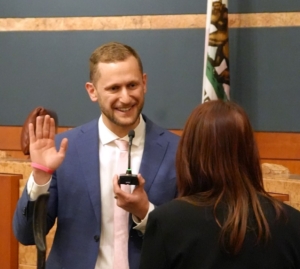By Stan Paul
Bryan “Bubba” Fish, a 2024 master of public policy graduate from the UCLA Luskin School of Public Affairs, is one of the latest Luskin grads to become an elected official, winning a Culver City Council seat in the November election.
Following graduation in June, Fish didn’t have time to rest on his laurels or take a vacation. The 33-year-old, winner of the “booked and busy” title by his fellow graduates, stepped out of Royce Hall in cap and gown, diploma in hand — in the middle of a competitive campaign that overlapped with the last two quarters of his public policy studies.
While juggling all of that, Fish, who concentrated on urban policy in his graduate studies, also worked in government affairs at the Los Angeles Department of Transportation before moving to his current job as a transportation deputy for Los Angeles County Supervisor Janice Hahn.
“As soon as I graduated, the campaign really ramped up. I basically got no break — the campaign just took over everything,” Fish said. He’s grateful now to be focused on work and serving as a council member.
Fish described his campaign as “people-powered,” with a lot of canvassing neighborhoods and knocking on doors. He recalls a politics of policymaking course led by UCLA Luskin Associate Professor Darin Christensen, where he saw a number of studies that showed “what works in policymaking and what doesn’t … and how do you know what really moves the needle in an election.”

Fish takes the oath of office at a Dec. 9 ceremony.
There is little evidence that the cavalcade of flyers dropping through mail slots during campaign season does much, Fish said. But “there’s a ton of evidence that walking and the candidate specifically meeting people is what moves the needle, and that’s what we did,” he said. “I walked every single weekend since March — so 32 weekends in a row.”
He ended up knocking on thousands of doors and making plenty of personal contact. Of the 20,000 doors his campaign reached, Fish said he personally accounts for a fifth, or 4,000: “I think it made all the difference. … We literally met so many people, and they shared our vision.”
Fish said he’s thankful for the classmates who helped out with his campaign, adding that he wished he had had more time to spend with them while at UCLA.
“They were really wonderful and supportive,” he said. “A lot of them came to my kickoff, and some of them came to the election night party, too.”
The new councilman, who was sworn in on Dec. 9 at Culver City Hall, said he ran on three main priorities, including housing for people of all incomes.
“We have built very little housing in Culver City” — only 400 multifamily units in a city of 40,000 people — since before he moved to California in 2009, he said. Fish grew up in Houston and came west on a scholarship to the University of Southern California, where he majored in film and TV production.
Fish is currently a renter in the city he now represents. He says when he came to Culver City, he got really involved: “I created Culver City Pride here, the first Pride celebration in the city’s history, and I got really involved in housing advocacy here, trying to get more affordable housing in the city because the city has built so little housing.”
His second priority is mobility — specifically creating healthy streets and climate resiliency across the Los Angeles region, which is also a top concern for him as a transportation professional. He focused the third prong of his campaign on public safety.
“We saw this backlash in California,” Fish said, referring to a rolling back of criminal justice reform and return to “a philosophy that has failed time and time again, expanding prisons, doubling down on incarceration. It hasn’t served us.”
And, he said, “We saw our leadership, our council majority for the last couple of years, not really relying on policy as a science, not really relying on data to make certain decisions. It was more about reacting.”
Fish is interested in creating a budget that is “rooted in care” and says Culver City is at the precipice of creating new systems that he is excited about, such as a mobile crisis team, “health and housing professionals that will go to you.”
“I’m so grateful to Luskin for giving me the tools that I needed to run a successful campaign and make change,” said Fish, adding that his connection to faculty and classmates were key to his run.
“I don’t think I would have won without them,” he said. “I don’t think I’d be in a position to do what I hope to be able to accomplish.”
Read about other UCLA Luskin Public Policy alumni elected to office in November.

